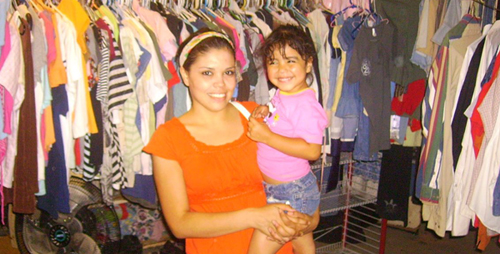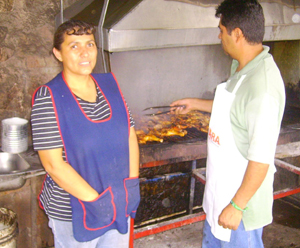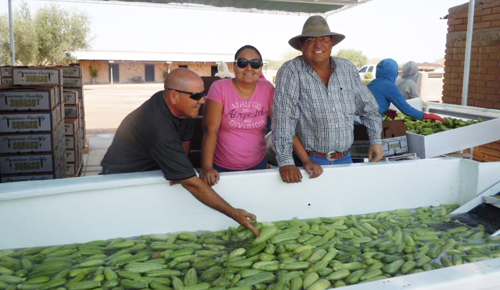ProMex Group
Micro-Financing Grows Mexican Businesses, Saves Lives

Kenya Aguilera and her daughter at her in-home clothing resale shop in Nogales, Sonora, Mexico. Photo: Bill Holliday
In a May 2014 interview with CNN, Pima County Medical Examiner Gregory Hess stated: “Since 2001, we’ve had around 2,200 immigrant deaths, most of them Mexican citizens.” According to the office of U.S. Customs and Border Protection, in fiscal year 2013, a total of 414,397 undocumented immigrants were apprehended after crossing the border illegally into the United States. Part of the responsibility of the U.S. Border Patrol is to spot and rescue immigrants stranded in the desert but the primary focus is on prevention by educating the would-be immigrants of the dangers involved in trying to cross the border illegally.
For immigrants, the gateway to dreams very often becomes the gateway to deportation or death instead of a feasible way out of poverty. Many fall into to the hands of abusive smugglers or “coyotes” and are robbed, beaten, sexually abused and worse. But the would-be immigrants keep coming. Few are prepared or equipped for such a grueling journey but are driven by economic necessity to come to the United States by whatever means possible. Regardless of the danger, immigrants continue to cross the borders to escape the abject poverty and lack of economic opportunities in Mexico. Most lack the education and job skills to establish a foothold and get ahead.
The ProMex Group is a local 501c3 nonprofit organization that strives to alleviate poverty and economically forced migration by providing disadvantaged Mexicans with access to capital and education to grow businesses. Through its partners in Mexico, EnComun and Cimarron, the ProMex group is also saving lives.
Its approach to alleviating poverty and potentially saving lives happens by providing resources, such as: MicroCredit – group loans/small loans to help micro-businesses; small business loans – individual loans/below market rate loans to help grow small to medium sized businesses; MicroSavings – to help clients with uneven income, unexpected expenses and business growth; education relating to small businesses and personal finances; preventative health classes and free health services with a mobile clinic that offers for diabetes, AIDS, syphilis and hypertension screenings, along with mammograms and PAP smears.

Fernanda & Roberto Rodriguez cooking at their outdoor grill to sell dished to the community in Nogales, Sonora, Mexico.
photo: Bill Holliday
The nonprofit operates locally and in the Northern Mexican cities of Nogales and Hermosillo. Aside from providing an alternative to death from trying to cross the U.S.-Mexico border, ProMex Group provides these services because there is a large demand for credit at a reasonable rate as incomes are low and living costs are high. The ProMex Group’s locales allow for support, supervision, impact evaluation and project visits. The organization has been improving the lives of impoverished Mexicans along the border since 2004, with over 30,000 loans given out and more than $7 million lent to grow small businesses.
Bill Holliday is the Certified Financial Planner and one of the board members for the ProMex Group who stated that, “The ProMex Group is a sustainable charity. The relatively low interest charged on the loans covers the minimal operating costs.” Holliday described the ProMex group’s microloan process as similar to that of Kiva.org, which is a global microlending organization. As the entrepreneurs repay their loans with interest, they remit funds back to the ProMex Group. As the loan is repaid, the ProMex Group lenders can withdraw their principal or re-lend it to another entrepreneur.
Holliday added, “Our overhead costs are quite low because our staff is comprised of volunteers. We have a small group of board members who also volunteer by writing grant proposals, provide technical support and education to our clients and secure accredited investors to invest in the ProMex Group’s Social Investment Fund.”
When asked to describe a microfinance borrower, Holliday stated that, “85% of our clients are women, and a majority of their businesses are home-based food preparation. A microloan can improve the quality of a recipient’s life and her family’s life. For example, simple improvements to upgrade cooking equipment or even sanitation in a home can help the business owner become more productive because she can focus on the growth of her business, rather than spending the her already limited funds on improvements or repairs.”
Holliday shared a success story of one of the ProMex Group’s clients, a Nogales, Sonora client who had good sewing skills. With her microloan she bought a sewing machine and fabric. The client sewed washer/dryer covers for her community because most of the community’s laundry facilities were outdoors. With the proceeds from this project, she bought more fabric and began to make children’s school uniforms. With the earnings from the school uniforms, she was able to make simple improvements to her home, provide healthcare for her children and successfully repay her microloan. The ProMex Group saved lives for the price of a sewing machine and fabric.
Currently, the ProMex Group is developing and raising funds for a new charitable farm co-op project to help agriculturally savvy clients rent land and water rights with which to plant and produce melons, which have two growing seasons per year. The goal is to help very low income farm workers and allow them to share in the profits of the business to improve their lives and the lives of their families and communities. The ProMex Group will provide the worker cooperative with technical support and receive loan repayments after each harvest. In three to five years, the workers will be the owners of the project that could support at least 50 families. ProMex will start another co-op with the repaid loans to again provide hope and a way out of poverty.
To get involved with, volunteer for or donate to ProMex, visit ProMexGroup.org, email info@promexgroup.org or call (520) 977-8537 for details.

Sammy gets squash ready for packaging and export in Caborca, Sonora, Mexico.
photo: Bill Holliday
Category: Community




